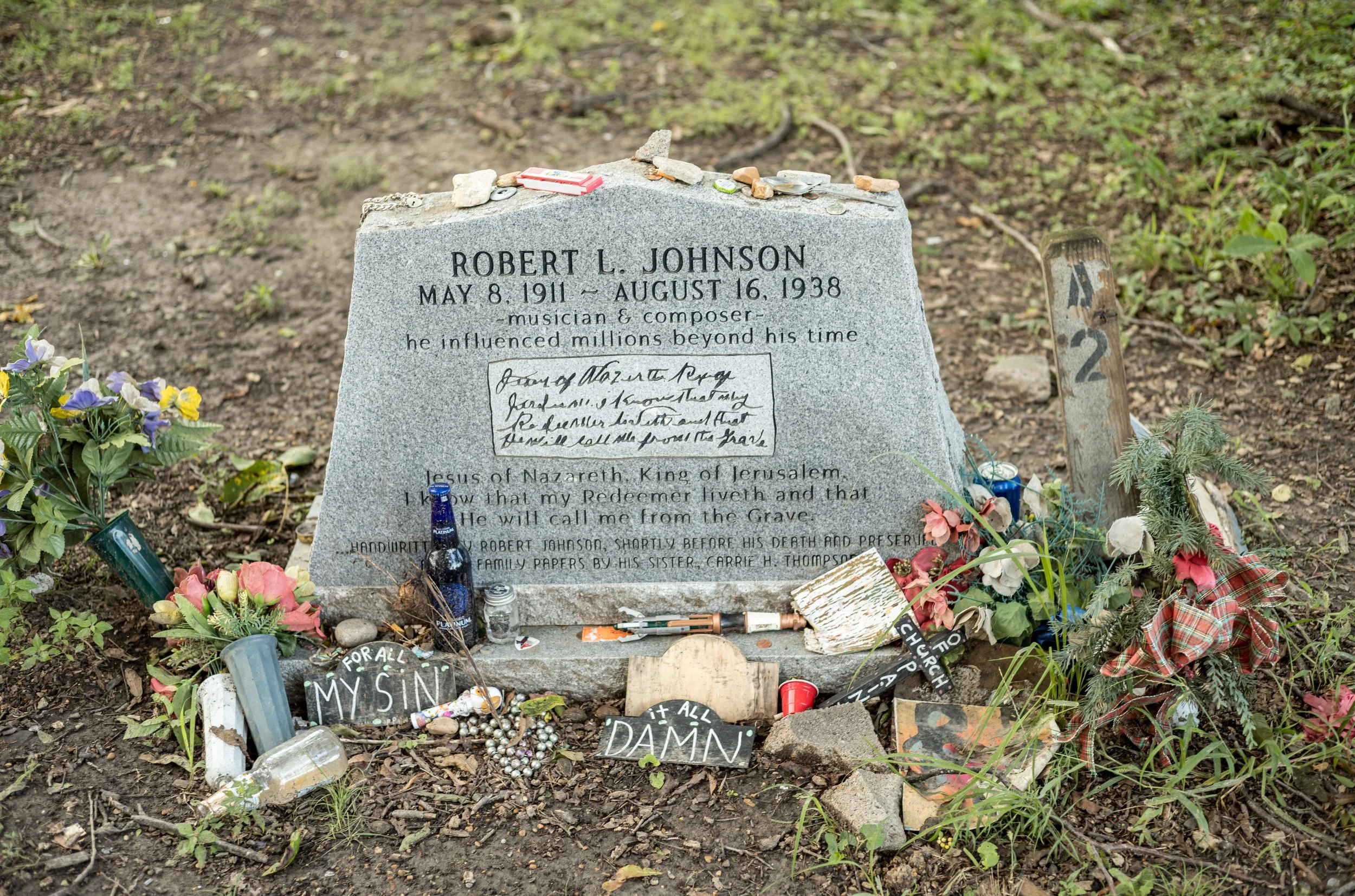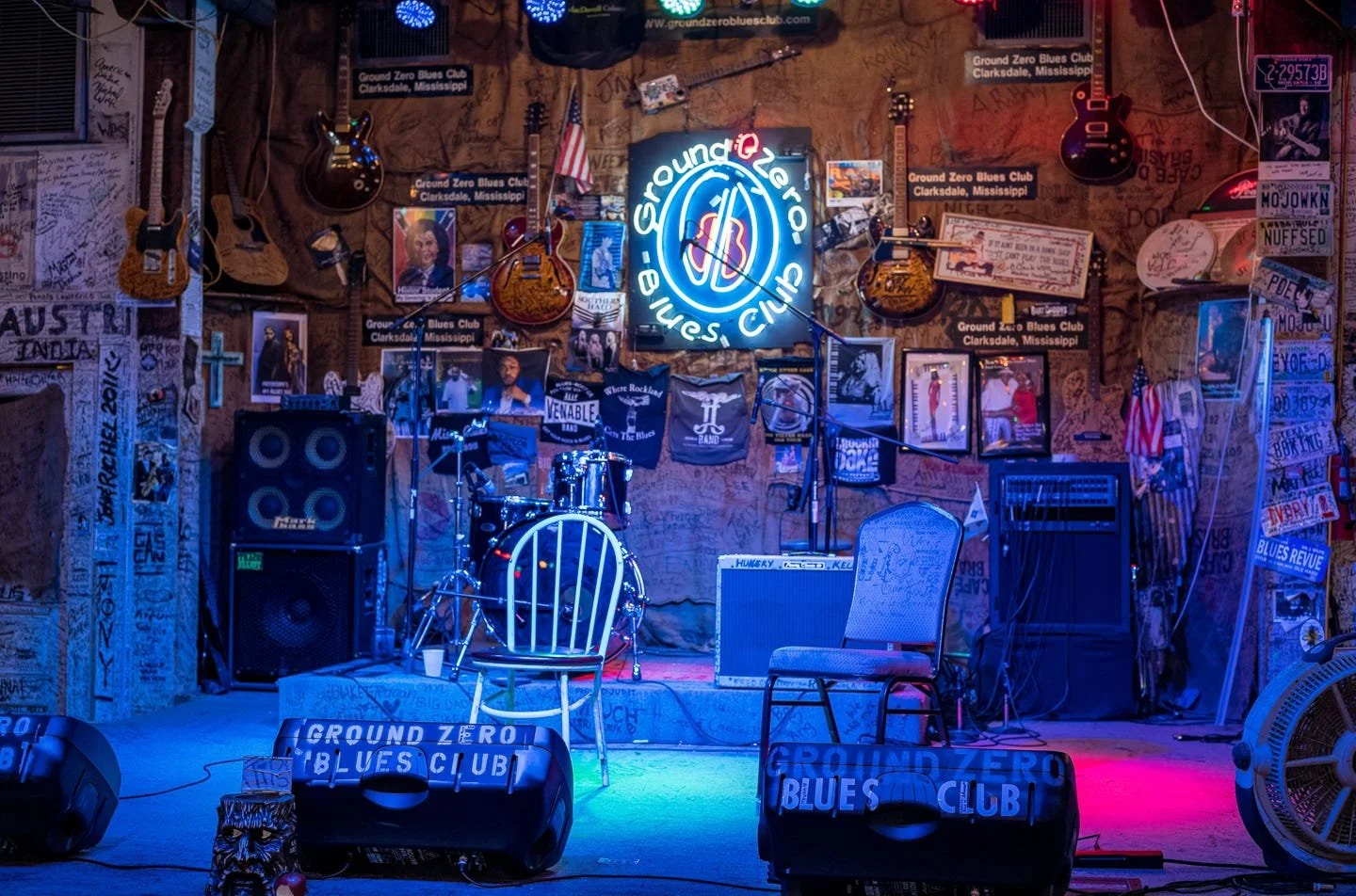Standing at the crossroads

What’s considered Robert Johnson’s final resting place outside Greenwood, Mississippi. (Photo: Joseph L. Murphy)
In the history of American music, few names are as celebrated as much as Robert Johnson. A larger-than-life figure in the history of blues music, Johnson stands as a monument of musical individuality and a symbol of the Mississippi Delta's cultural heritage.
Johnson, born in Hazlehurst, Mississippi, in 1911, was a virtuoso of the guitar and songwriting. In his short life, he crafted a small catalog of songs that have not only come to define the blues genre but also influenced generations of musicians. Johnson's innovative style blends deeply emotional lyrics with complex guitar techniques, creating a sound that is intimate and haunting.
During Johnson’s early life, he bounced from town to town, working and entertaining farm laborers who spent backbreaking days under the hot sun picking cotton.
The legend of Johnson looms large, a figure steeped in the folklore surrounding his journey to the crossroads. Tales suggest he ventured to a lonely crossroads near Clarksville, Mississippi, where he sold his soul to the devil for talent, fame, and fortune.
‘Hellhound On My Trail’ and ‘Me and The Devil Blues’ are songs that were said to have resulted from his visit to the crossroads and his "deal" with the devil. Despite his life being cut short at the age of 27, the same as Brian Jones, Jimi Hendrix, Janis Joplin, Jim Morrison, Kurt Cobain, and Amy Winehouse, the influence of his work has far outlived him.
Johnson's music has profoundly impacted countless musicians throughout the decades. Many of the biggest names in music, including Eric Clapton, Keith Richards, Bob Dylan and Robert Plant, have acknowledged Johnson's influence on their work.
Ground Zero Blues Club, co-owned by Morgan Freeman, is several miles from the dubious Crossroads in Clarksdale, Mississippi. (Photo: Joseph L. Murphy)
Although Johnson's influence has spread worldwide, nowhere is it more pronounced than in his home state of Mississippi. The state has embraced Johnson as a cultural icon, and his music continues to play a pivotal role in shaping the state's cultural identity.
Johnson's poignant lyrics, combined with his unique guitar style, became a blueprint for countless musicians. His impact extended beyond the blues, seeping into rock, folk, and jazz, influencing generations of artists.
In Mississippi, Johnson's memory is kept alive through various monuments and dedicated music festivals. The Robert Johnson Blues Foundation in Crystal Springs works to preserve Johnson's legacy, providing scholarships for young musicians and organizing yearly music events.
With Johnson's influence clearly felt, Mississippi continues to be a breeding ground for Blues musicians. The music venues, clubs, and juke joints that line the Mississippi Blues Trail are filled with the raw, emotive power that Johnson brought to his music.
Johnson, referred to as the King of the Delta Blues, remains a pivotal figure in the history of American music. His influence continues to echo through musicians, young and old, around the globe.
“Robert Johnson, to me, is the most important blues musician who ever lived. He was true, absolutely, to his own vision, and as deep as I have gotten into the music over the last 30 years, I have never found anything more deeply soulful than Robert Johnson,” Eric Clapton said in an interview. “His music remains the most powerful cry that I think you can find in the human voice, really … it seemed to echo something I had always felt.”
For more than two decades, Joseph L. Murphy has had the pleasure of meeting and connecting with people from all walks of life through photography. He has photographed presidents and heads of state, traversed the winding alleyways of the Fes Medina in Morocco, photographed the sprawling countryside and people that make up Argentina and covered events that have defined the U.S. Most recently, Murphy’s travels have taken him to Cambodia, Mexico, China, Vietnam and Ecuador.
He has spent the past 20 years specializing in agriculture photography for multiple organizations, publications and marketing projects.
A graduate of the University of Iowa, Murphy determined at an early age that his love of photography would shape his vision for life.

